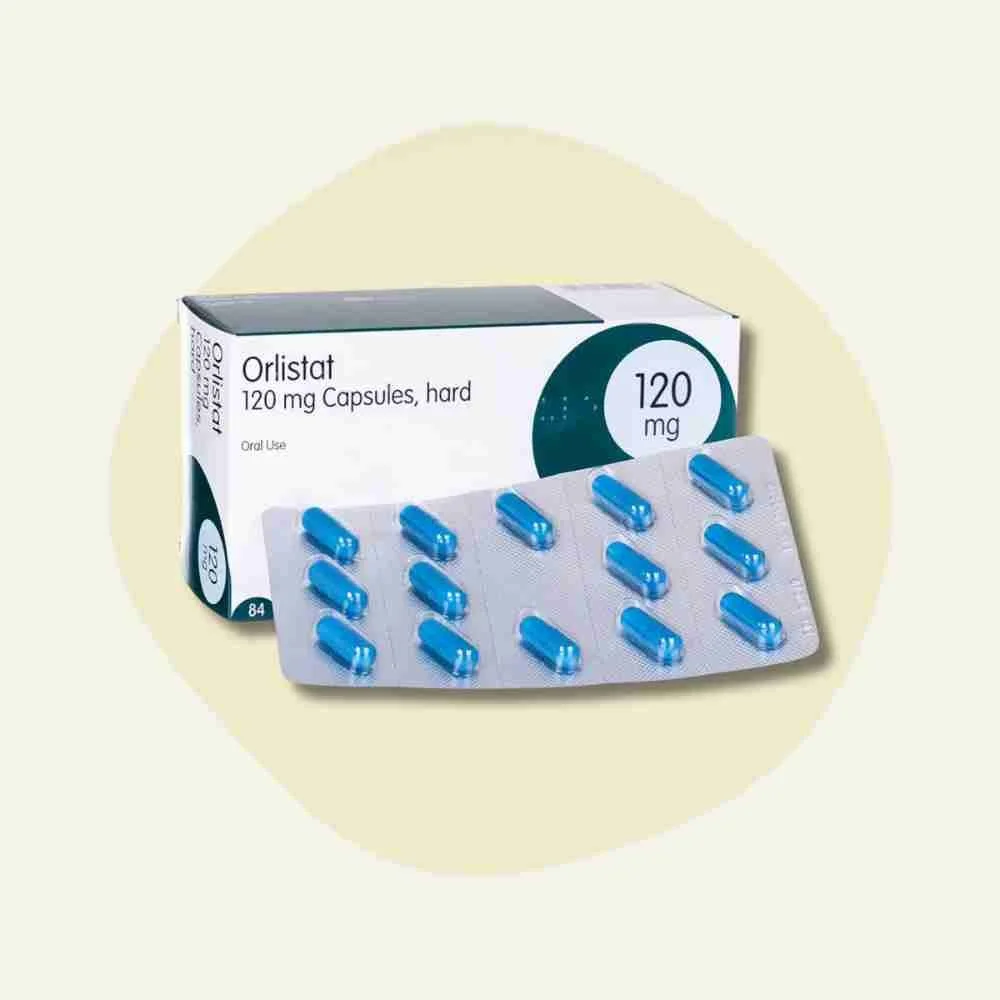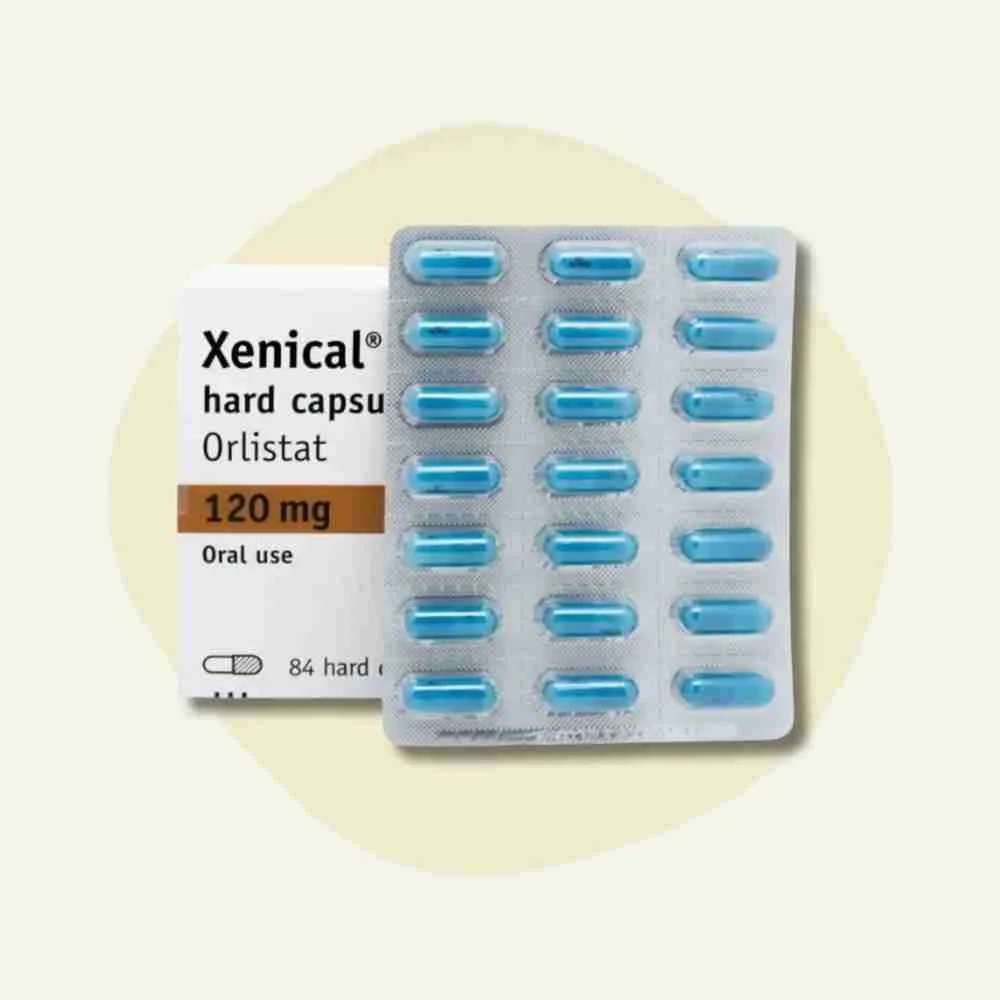Prescription weight loss pills
Find out which tablets UK doctors can prescribe for weight loss, who qualifies, and how to use them safely.
What is a prescription weight loss pill?
In the UK a prescription-only medicine (POM) is a drug you can only get with a script from a qualified prescriber. The main prescription weight loss tablet is orlistat 120mg, sold as a generic capsule or the brand name Xenical. Lower-dose Alli is sold over-the-counter, and is not a POM.
Who qualifies for prescription weight loss tablets?
Your GP must see you’ve tried diet and exercise first. Eligibility includes:
Adults without diabetes - BMI ≥ 30, or BMI ≥ 28 with a risk factor (e.g. high blood pressure).
Adults with type 2 diabetes - BMI ≥ 28 - lower cut-off due to higher health risks.¹
Under-18s - Very rare, only considered in specialist obesity clinics.
Current tablets in the UK
Orlistat (generic)
How it works. Blocks the fat-digesting enzyme lipase, so about one-third of the fat you eat leaves your body undigested.²
Dose. One 120mg capsule with each main meal that contains fat.
Side-effects. Oily stools, more urgent or frequent toilet trips, oily discharge from your rectum, and flatulence.
More detail. See our orlistat guide.
Xenical (branded)
Xenical contains the same drug and strength as generic orlistat but comes in Roche-manufactured capsules.
Cost and prescription process
-

Visit your GP practice
Typically, weight, height, medical history and any medicines are checked.
-

1-month script
First prescription is usually a 1-month supply to check how well you tolerate it.
-

3-month review
You must lose at least 5% of your starting weight by 3 months to continue treatment.³
-

Long-term stop rule
Most people use the pill for up to 2 years; longer use often requires specialist care.
-

NHS or private
NHS England prescription fee (£9.90) or pay privately (~£34-£79).
Prescription weight loss pills FAQs
Do prescription pills work better than over-the-counter medication like Alli?
Yes, in most studies they do. Xenical and generic orlistat contain 120mg of the drug, while Alli is 60mg. The higher dose blocks more fat, so people often lose weight faster but may get stronger side-effects.
Can my GP prescribe weight loss pills on the NHS?
They can prescribe 120mg orlistat if your BMI is ≥ 30, or ≥ 28 if you have a weight-related condition like high blood pressure. You must also try diet and activity steps first.
What should I do if I get oily or loose stools while taking orlistat?
This happens because unabsorbed fat leaves your gut. Cut each meal to under 15g of fat and side-effects usually settle down.
Why am I seeing orange spotting on my underwear?
It’s the same unabsorbed fat colouring your stool. Wear dark underwear and pack a spare pair for confidence. Get more advice in this NHS patient information leaflet.
Is it normal to get mild stomach cramps with orlistat?
Yes. Your gut is adjusting to less fat absorption. Cutting back on fried or fatty foods usually eases the cramps.
Can orlistat cause vitamin deficiencies?
Orlistat can lower vitamins A, D, E and K, which dissolve in fat. Taking a multivitamin at bedtime can keep levels healthy.
When should I call a doctor?
Phone 111 or see your GP quickly if you get severe stomach pain, persistent vomiting or dark urine - these are rare warning signs of liver trouble.
What prescription weight loss pills are in clinical trials?
Daily tablets that copy the gut hormone GLP-1 are being tested, including oral semaglutide and orforglipron. However, they are not yet licensed in the UK for weight loss.
Medically reviewed by Dr Jackir Hussain
This page was last medically reviewed by Dr Jackir Hussain on 14 July 2025.
At Pill Scout, we prioritise accurate, evidence-based health information you can trust.
Our medical team regularly reviews and updates our content to ensure it stays aligned with the latest clinical research and guidance.
Dr Jackir Hussain, MBChB, MRCGP
GMC: 7074207
Dr Jackir Hussain is a UK-based GP with over 14 years of clinical experience since earning his medical degree from the University of Manchester. He has worked across diverse healthcare environments, including NHS GP surgeries, urgent care services, homeless shelters, and telemedicine platforms.
His areas of interest include general practice, weight loss, and the use of digital health to improve patient access to care.
Sources
¹ NHS. Obesity treatment. Updated February 2023.² Patient.info. Orlistat: weight loss medicine. Last reviewed June 2024.
³ GP Notebook. NICE guidance: Orlistat for the treatment of obesity. Last reviewed September 2024.
Sign up for trusted updates
Be the first to hear when new weight loss tablets are reviewed by UK regulators.




